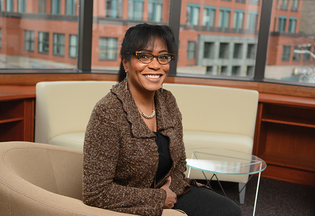
Michael Marsland
When she was twelve, Patricia Melton ’83 thought she’d attend community college. Her path took her to Yale, educational work, and much more—including New Haven Promise.
View full image
The problem with writing about Patricia Melton ’83 is that there’s much too much to write about.
You may have heard that she’s the president of New Haven Promise, which helps New Haven public-school students go on to college. You probably don’t know that at Yale, she was a first-generation student and an All-American and served in the Marine Corps Reserve. Soon after finishing college, she ranked fourth in the US for women’s 400-meter hurdles, and nearly got a spot in the Olympics.
But all that was just a start. She received an MA in education at Arizona State. She helped establish high schools through Ohio and Indiana that let students earn an associate’s degree. After she became the chief academic officer for Indiana’s third-largest school district, the district finally achieved the standards set by the US Department of Education for students’ yearly progress.
And in late June, Melton received the Dick Enberg Award, an honor given every year to an athlete whose career, promotion of education, and work toward a better society deserve national distinction. Melton was very modest when I asked her about it. She laughed and said, “I’m the least famous person who has ever received the Dick Enberg Award!”
Melton laughs often and joyfully. Meeting her, you wouldn’t think she had encountered much difficulty in her life. But her mother died of complications from a car accident when Melton was only 12. She moved in with her 25-year-old sister at a housing project in Cleveland, Ohio, expecting she’d eventually go to community college. (“That’s how small my world was. Where I come from, it was community college.”) But in the eighth grade she transferred to a new school and met a new friend, who in turn introduced her to a student who told her about A Better Chance, a nonprofit that works to put talented young students of color into independent schools.
“I was desperate,” Melton says. “I had lost my mother. I was not being challenged in my public school. I was not being challenged at all. And I said, ‘Okay. I’ve got to take my destiny into my own hands.’ I just became obsessed with getting the [Better Chance] scholarship. I felt like it was my ticket out.”
And it was. She enrolled at Middlesex School in Massachusetts. It would put her on the road to Yale.
But she also lost something. “The moment I set foot on Middlesex’s campus,” she remembers, “I became disconnected from my hometown.” She was different from most of the people in Concord, yet when she went back to Cleveland, her accent had changed. She no longer fit in with her own peer group. “I should not have had to give up that connection to get a great education,” she says.
That experience is one of the reasons why Melton values New Haven Promise: students don’t have to leave their home community in order to realize their full abilities. They stay “very much connected. Integrated. The village concept works.”
For several years before New Haven Promise was established, the New Haven public schools had seen lower and lower rates of enrollment and graduation—a problem that reflected badly on both New Haven and Yale. In about 2009, then-mayor John DeStefano Jr. approached then–Yale president Rick Levin ’74PhD with the Promise concept. The two made an agreement: if the city revamped its schools, Yale would deliver monies for Promise. And it worked. The school system was overhauled and upgraded, and parents began to hear that New Haven students who stayed in New Haven schools could get funding to help them attend colleges and universities in Connecticut. So far, Yale has given over $25 million to the cause.
Melton took over Promise in its second year. From its start in 2009, she says, the number of students in New Haven public schools increased as much as 17 percent and reached a 50-year high. (Recently, the pandemic has caused some sag.) She has created programs that have helped some 1,000 post-college Promise graduates transition into paid internships or become full-time members of the workforce, paths many young people don’t know how to navigate.
Melton and the girl she’d met in eighth grade—the one who pointed her to A Better Chance—are still good friends. New Haven and Yale owe that thoughtful woman a tip of the hat, and a very hearty thanks.
 loading
loading